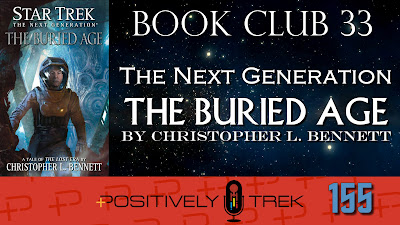Infocom was of course the developer and publisher of the quintessential text-based adventure games (or Interactive Fiction), all descendants of the original mainframe Zork (or Dungeon), which was the result of four guys from MIT (Dave Lebling, Marc Blank, Bruce Daniels, and Tim Anderson) seeing the original "Adventure" (aka "Colossal Cave"), and deciding they could do better. Back in 1979, when they ported it to the existing desktop platforms, it had to be split up into three parts in order to fit. Infocom games were known for their rich text, creative puzzles, exceptionally good parsers, availability for nearly every platform that could use floppy disks, and steadfast refusal to incorporate graphics until the company's very last releases.
The "scavenger hunt" thread of No Time Like the Past (with Seven being sent to historically significant places, and finding herself thrown back to focal points in time) especially reminds me of the Infocom H2G2 game because in the latter, one has to regularly activate the Infinite Improbability Drive in order to send oneself to various locations in order to retrieve objects. And initially, you have no control over where you're sent, because you don't have the requisite cup of tea, just a cup of "Advanced Tea Substitute."
These days, about the only computer game I play with any regularity is the chess program that comes with Mac OS.
The "scavenger hunt" thread of No Time Like the Past (with Seven being sent to historically significant places, and finding herself thrown back to focal points in time) especially reminds me of the Infocom H2G2 game because in the latter, one has to regularly activate the Infinite Improbability Drive in order to send oneself to various locations in order to retrieve objects. And initially, you have no control over where you're sent, because you don't have the requisite cup of tea, just a cup of "Advanced Tea Substitute."
These days, about the only computer game I play with any regularity is the chess program that comes with Mac OS.

